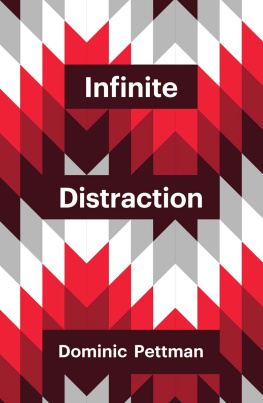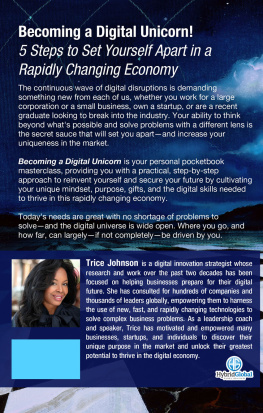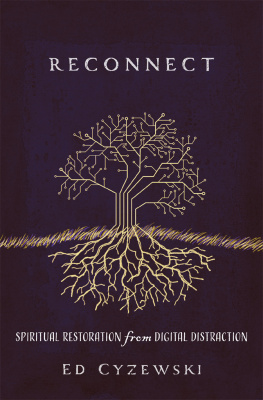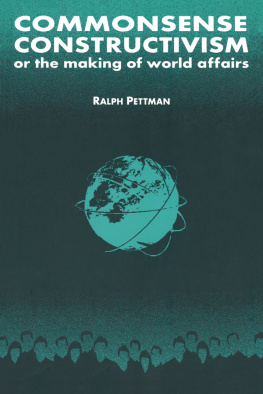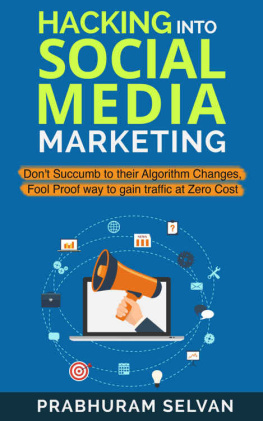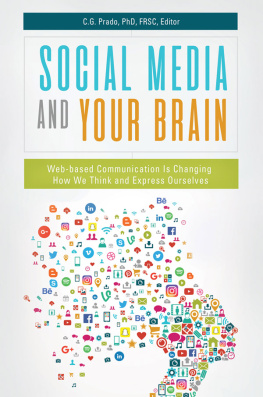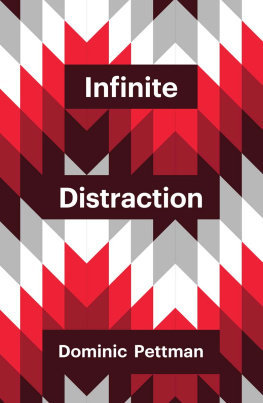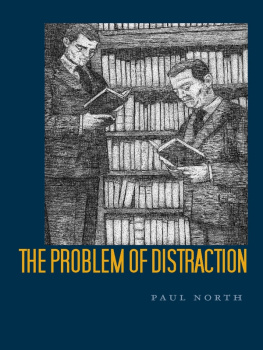Pettman - Infinite distraction: paying attention to social media
Here you can read online Pettman - Infinite distraction: paying attention to social media full text of the book (entire story) in english for free. Download pdf and epub, get meaning, cover and reviews about this ebook. City: Malden;MA, year: 2016, publisher: Wiley;Polity, genre: Romance novel. Description of the work, (preface) as well as reviews are available. Best literature library LitArk.com created for fans of good reading and offers a wide selection of genres:
Romance novel
Science fiction
Adventure
Detective
Science
History
Home and family
Prose
Art
Politics
Computer
Non-fiction
Religion
Business
Children
Humor
Choose a favorite category and find really read worthwhile books. Enjoy immersion in the world of imagination, feel the emotions of the characters or learn something new for yourself, make an fascinating discovery.
- Book:Infinite distraction: paying attention to social media
- Author:
- Publisher:Wiley;Polity
- Genre:
- Year:2016
- City:Malden;MA
- Rating:5 / 5
- Favourites:Add to favourites
- Your mark:
- 100
- 1
- 2
- 3
- 4
- 5
Infinite distraction: paying attention to social media: summary, description and annotation
We offer to read an annotation, description, summary or preface (depends on what the author of the book "Infinite distraction: paying attention to social media" wrote himself). If you haven't found the necessary information about the book — write in the comments, we will try to find it.
Pettman: author's other books
Who wrote Infinite distraction: paying attention to social media? Find out the surname, the name of the author of the book and a list of all author's works by series.
Infinite distraction: paying attention to social media — read online for free the complete book (whole text) full work
Below is the text of the book, divided by pages. System saving the place of the last page read, allows you to conveniently read the book "Infinite distraction: paying attention to social media" online for free, without having to search again every time where you left off. Put a bookmark, and you can go to the page where you finished reading at any time.
Font size:
Interval:
Bookmark:

Theory Redux
Roberto Esposito, Persons and Things
Sreko Horvat, The Radicality of Love
Dominic Pettman
polity
Copyright Dominic Pettman 2016
The right of Dominic Pettman to be identified as Author of this Work has been asserted in accordance with the UK Copyright, Designs and Patents Act 1988.
First published in 2016 by Polity Press
Polity Press
65 Bridge Street
Cambridge CB2 1UR, UK
Polity Press
350 Main Street
Malden, MA 02148, USA
All rights reserved. Except for the quotation of short passages for the purpose of criticism and review, no part of this publication may be reproduced, stored in a retrieval system, or transmitted, in any form or by any means, electronic, mechanical, photocopying, recording or otherwise, without the prior permission of the publisher.
ISBN-13: 9781509502301
A catalogue record for this book is available from the British Library.
Library of Congress Cataloging-in-Publication Data
Pettman, Dominic.
Infinite distraction / Dominic Pettman.
pages cm
Includes bibliographical references and index.
ISBN 978-1-5095-0226-4 (hardback) -- ISBN 978-1-5095-0227-1 (pbk.)
1. Distraction (Philosophy) 2. Social media. 3. Critical theory. I. Title.
B105.D58P48 2015
302.231--dc23
2015019466
The publisher has used its best endeavours to ensure that the URLs for external websites referred to in this book are correct and active at the time of going to press.
However, the publisher has no responsibility for the websites and can make no guarantee that a site will remain live or that the content is or will remain appropriate.
Every effort has been made to trace all copyright holders, but if any have been inadvertently overlooked the publisher will be pleased to include any necessary credits in any subsequent reprint or edition.
For further information on Polity, visit our website:
politybooks.com
This book would not exist were it not for Laurent de Sutter and his keen editorial eye. It was he who plucked one of my all-too-frequent Facebook updates from the digital torrent and suggested that I turn it into a focused polemic for his new book series. Laurent has been an excellent respondent to my work and staunch champion of its idiosyncrasies, for which Im exceedingly grateful. Thanks are also due to John Thompson, who welcomed me to the postmodern polis of Polity with great hospitality. It was John who encouraged me to take a position rather than perform the usual academic labors from an imagined, highly abstract, Archimedean point. Thanks also to Neil de Cort and the editorial team at Polity for helping to usher this book into the world with such efficiency, good humor, and grace. Margret Grebowicz provided consistently brilliant feedback to my sometimes stumbling thinking around these topics. Eugene Thacker has helped me glimpse a darkly utopian world beyond, or perhaps simply before, social media. And Merritt Symes, as always, is my precious partner in various hedonic diversions within the unfoldings of daily life.
It would take several pages to personally thank all those people (colleagues, students, friends, and virtual friends) who have enriched my micromoments with all manner of distractions, both via the screen and in person. So I simply offer this book to my own private multitude as a perverse form of gratitude for such.
This book began its life as a humble Facebook update. In terms of media ecology and technological evolution, this is a bit like starting with a bird and ending up with a dinosaur. Despite being a professor of culture and mediathat is, a professional skeptic of technological promises and practicesI certainly surrender an inordinate amount of my time interacting online in social media spaces. For fellow critic Jonathan Crary, this is no doubt in part because Ilike everyone elseam obliged to submit to mandatory techniques of digital personalization and self-administration (43). But I would be lying if I pretended that mediated socialization doesnt bring me many micro-pleasures, along with generous infusions of exasperation, boredom, and spleen. Moreover, I would have trouble denying the fact that for every intellectual observation I post or link to, I upload several more frivolous or trivial info-morsels, designed more to distract than instruct or edify. If accused of wasting time or procrastinating, I can certainly use my job as an alibi. Know your enemy. But the truth is that having a critical-theoretical perspective on something does not necessarily make you immune to it. An intellectual understanding of a problem does not prevent an affective investment in the same (as we all know, from our romantic histories as much as from our credit card receipts).
The following pages explore some of the more troubling effects of what we might call the digitalization of distraction, along with its luminous shadow: attention. This book therefore touches upon some of the specific technological, cultural, social, and political constellations that solicit these two intimately connected phenomena. From anecdotes concerning common or gardenvariety distractions to official reports of acute clinical cases of ADHD, there is a strong tendency to blame technology for a perceived pandemic of preoccupation. Indeed, the media has often been painted as little more than a distraction machine, engineered for what the curmudgeonly critic Theodor Adorno rather patronizingly called the cross-eyed transfixion with amusement. For teachers like myself, distraction is our nemesis, just as attention is our lifeblood. Given the disheartening state of the world today, howeverfrom terrorism to disease to corruption to exploitation to injustice to inequality to ecological catastrophewe are likely to feel a pang of conscience at obliging young people to pay attention. The more we notice about the way the world works, the more we are likely to feel a crippling combination of fury, resentment, depression, shame, and helplessness. This is certainly one reason why social media is so addictive: the new opium of the masses. It dulls the pain. It screens out the screams of those suffering just outside our personal experience (or indeed the screams in our own head, on a particularly bad day). Certainly, a lot of our problems are not necessarily curable by better economic or social policies. Much of the trauma comes with being human, and thus being burdened with the awareness of mortality and other miserable fates that await us. Being unable to cure death, wretchedness and ignorance, wrote Pascal, we have decided, in order to be happy, not to think about such things. Social media helps us not to think about such things. So there is already an irony in trying to think through and about social media.
Something else to note from the outset: social media is not a thing, or a place, or a new medium. It is a constellation, a concept. It is a virtual, evolving assemblage of elements, includingand especiallyolder forms of media, now diagrammed in novel articulations. We should thus not make the mistake of reifying it into a stable object, even as it seeks to reify us in many ways, as well as our interactions. Just as Guy Debords notion of the Spectacle did not simply denote the sum total of images circling in the postwar mediascape, but also expressed the ways in which we now think in and relate via images embedded deep in our heads, social media names the simultaneously limitless and circumscribed ways we interact via newly enmeshed communications and entertainment technologies.
Font size:
Interval:
Bookmark:
Similar books «Infinite distraction: paying attention to social media»
Look at similar books to Infinite distraction: paying attention to social media. We have selected literature similar in name and meaning in the hope of providing readers with more options to find new, interesting, not yet read works.
Discussion, reviews of the book Infinite distraction: paying attention to social media and just readers' own opinions. Leave your comments, write what you think about the work, its meaning or the main characters. Specify what exactly you liked and what you didn't like, and why you think so.

